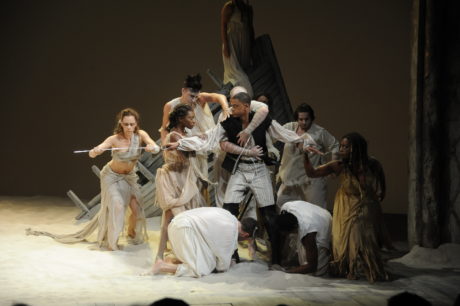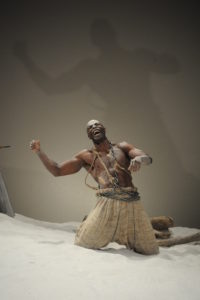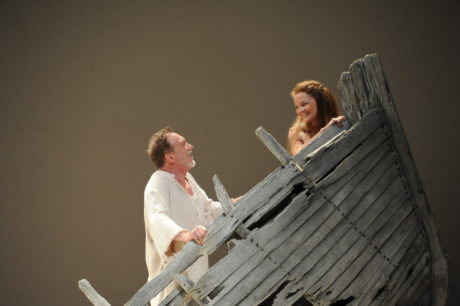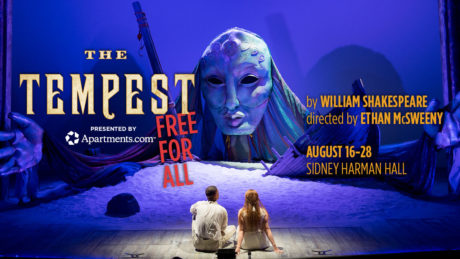The Tempest is one of Shakespeare’s greatest plays. Ethan McSweeny’s production makes us realize once again how profound it really is. This Tempest retains most of the cast of the original, which was a marvel in and of itself. Here, the actors who are playing their parts for the second time find fresh depth and richness in their roles. And the new principals–Patrick Page (Prospero), Sarah Topham (Ariel), and Edward Gero as Alonso, offer memorably insightful performances. This is not only an achingly beautiful Tempest; it is an opportunity to observe the art of acting at its finest.

In his book To the Actor, (Harper & Row, 1953) Michael Chekhov said: “[A]cting should ever be a joyous art.” The joy is, in this latest ‘Free-for-All’, everywhere apparent.
Patrick Page as Prospero explores the full range of the character in all of its subtleties. At first, there is bitterness and anger, as he tells his beloved daughter Miranda (Rachel Mewbron) how his brother Antonio (Gregory Linington) betrayed him and stole his dukedom. Page and Mewbron have a realistically complicated father-daughter relationship, full of tension, humor, and tenderness.
Mewbron’s Miranda is what J.D. Salinger would call “a stunning and final girl.” It is a real pleasure to see this young actress blossom as she makes novel discoveries. Avery Glymph as her lover Prince Ferdinand matches her in naivete and sheer exultation. As the two stare at each other, entranced, they are not only believable but irresistibly funny.
Ariel (Sarah Topham), one of the magical sprites of the island, is Prospero’s assistant, who helps him gain revenge on Antonio and his fellow conspirators. Caliban (Clifton Duncan), son of the witch Sycorax, who once ruled the island, has become Prospero’s slave. These characters are two of Shakespeare’s most remarkable creations. Topham, like Sofia Jean Gomez before her, is wonderfully buoyant. But while Gomez’ Ariel had a kind of thoughtful melancholy, Topham is effervescent and wry.

Clifton Duncan’s Caliban has always been exhilarating to watch. It is still painful to see the amount of abuse Caliban takes, but Duncan attacks the role with such brio that one is able to forget it, momentarily at least. Duncan has an extraordinary voice for the stage and gives some of Caliban’s most heartbreaking lines the prominence they deserve.
Alonso, King of Naples, Ferdinand’s father, spends much of the play grieving for his son, whom he believes died in the shipwreck which begins the play. Edward Gero’s devastation is so real it is almost frightening. And he manages to make Alonso’s transition (the character has one of Shakespeare’s miraculous transformations) authentic and moving.
The conspirators, Antonio (Gregory Linington), and Sebastian (David Bishins) are convincing in their villainy, and both actors succeed in adding unusual shadings to these difficult roles. Avery Clark as Adrian, the courtier, has humor and an engagingly light touch. Ted von Griethuysen’s Gonzalo was so poignant it almost made me cry. To watch him perform is an acting class in itself.
The glories of clowns Trinculo (Liam Craig) and Stephano (Dave Quay) have only grown greater with time. Trinculo has a quizzical air which makes his every line sound like a joke, even if it isn’t. Quay adds to the comedy with his pleased reaction to the dizzying changes in his fortunes. Clifton Duncan as Caliban also excels in these deliciously chaotic scenes.
The climactic opening scene, full of thunder, crackling lightning, and desperate sailors, is vivid and intense. Sean Fri returns as the Boatswain, and Gabriel Hornig is the new Master. The visual effects, as well as the music, add to the dreamlike quality of the experience. The giant Heads(Puppet Designer is James Ortiz), portraying the goddesses Iris, Juno, and Ceres, inspire a combination of wonder and apprehension which may be similar to what the ancients felt about these inexplicable beings. Nancy Anderson is, again, dazzling as the haunting Voice during the Wedding Masque.
The Ensemble has several new members: Renea Brown, Audrey Bertaux, Gabriel Hornig, Suzanne Lane, Randy Snight, Cassia Thompson, and Hermon Whaley. Kedren Spencer, Benjamin J. Henderson, and Dan Jones return. All perform with grace and style, and look extravagantly dramatic. The inventive costumes are by Jennifer Moeller.
Scenic Designer Lee Savage’s set has an austere loveliness. Lighting Designer Christopher Akerlind, Sound Designer Nevin Steinberg, Composer Jenny Giering, and Choreographer Matthew Gardiner are all to be congratulated.

The key to the play is, of course, Prospero, and Patrick Page finds many colors in the part. He is the doting father; the tortured soul; the proud magician; and the wounded brother, all in one. He delivers Shakespeare’s exquisite speeches with nuance and deep sincerity. His look of anguish as he clutches his book (prior to throwing it away) is almost childlike. Instead of the great wizard, we see a young boy clinging to his favorite toy.
The play is, in a way, a dream; but what a dream! And how hard it is to wake up.
Running Time: Two hours and 20 minutes, with one 25-minute intermission.
The Tempest plays through August 28, 2016 in Shakespeare Theatre Company’s Sidney Harman Hall – 610 F Street NW, in Washington DC. For tickets, please visit the box office two hours prior to curtain or enter the online lottery.
LINK:
‘The Tempest’ at Shakespeare Theatre Company’s ‘Free For All’ reviewed by Katie Bogdan on DCMetroTheaterArts.
RATING:





